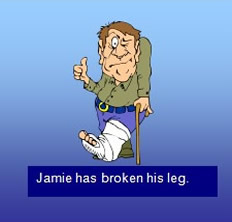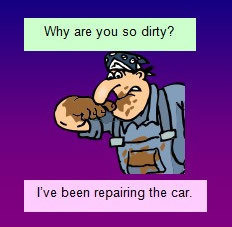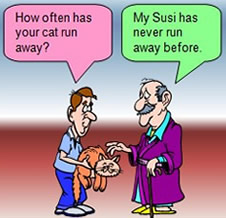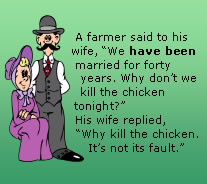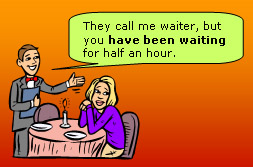| Generally
the present perfect is used to express past time that is always related
to the present in some way: |
|
Sometimes the past
action is very recent,
or it is still continuing
at the present moment,
or
we don't know
exactly when the past action happened,
or the time
is irrelevant,
because what matters
is just the fact that it happened and has relevance
for the present. |
The connections to the present can vary -
we
either focus on the result or a consequence of an action in the past,
or an action or a state include
the present moment. |
In order to
take into account all the different aspects of the present perfect, it
is necessary to talk about
3 groups of meanings
/ notions expressed by the present perfect simple and progressive:
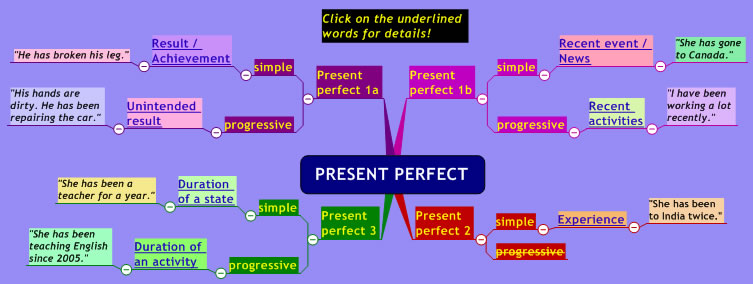
|
| The
Present Perfect Simple |
|
The
Present Perfect Progressive |
| 1a.
Result / Achievement |
|
1a.
Unintended result of recent activities |
The present
perfect simple 1a is used to express an action or an event that
took place in the past and brought about the result seen
now.(Paul has lost his keys. He can't enter
his flat.)
The time of the
action is not important and therefore not mentioned. (If
it is mentioned, it's only with the time expressions denoting an unfinished
period of time: already, yet, so far, just, recently, lately, today, this
week, ... ) |
|
The present
perfect progressive 1a is used to express an activity which
took place in the past (usually in the very recent past)
and the consequences or unintended
results of
which are seen or felt now. (I'm tired. I've been working
a lot.)
The focus is not on the accomplishment of the activity but on the
activity itself which caused the new, usually unpleasant, situation. |
|
|
|
|
|
|
|
|
|
|
|
|
|
|
|
|
|
|
|
|
| 1b.
Recent event / News |
|
1b.
Recent activities |
The present
perfect simple 1b is used for reporting a recent event (I've
seen Mary. She wants you to call her back.) or a piece of news (The
Mayor has resigned.).
In this case, the link to the present is not based on a present
result in the first place. What matters is the fact that something has happened
which the speaker is introducing as a new piece of information. It's not
important when it happened, but that it happened. If the time is mentioned,
it's usually the time adverb "just". |
|
The present
perfect progressive 1b is used to describe (repeated) activities somebody
has been engaged in in a recent period of time (lately,
recently, in/over/during the last/past days/weeks/months/years).
(I've been working a lot over the past weeks.)
However,
if we say how often those repeated activities have happened, we use the
present perfect simple, because this stresses the idea of completion (I've
played tennis six times this year.). |
|
|
|
|
|
|
|
|
|
|
|

|

|
|
|
|

|

|
|
| 2. Experience |
|
The
present perfect progressive cannot be used to express this meaning!!! |
 |
The present
perfect simple 2 is used for talking about what somebody has
or hasn't done and how many times they have done something in a period
of time leading up to the present. In the first place it is used
to talk about life experiences (Have
you ever been to India? Yes, I've been there twice.), but in
other situations involving periods of time up to now,
too.
The present perfect simple 3 is
also used after the expressions"...... the first/second/third/...
time .........." |
I haven't seen John this week. Have you seen him?
A: Have you heard The Herbaliser's latest CD yet?
B: "The Herbaliser"!? I've never heard of him before!
On holiday:
A:
Have you seen the cathedral yet?
B: Yes, we have already seen it, but we
haven't seen many other sights yet.
"Already" is used in affirmative sentences!
"Yet" is used in questions
and negative sentences!
close
|
|
|
|
|
In
American English the past simple is often used
for expressing this meaning
!
(Did you ever eat snails?) |
|
|
|
|
|
 |
|
|
3. Duration
of an activity |
| The present
perfect simple 3 is used
for talking about situations continuing up to
now when we want to say how
long a state has lasted. It is always used with the preposition for (for
a period of time) and since (for
the point of time of the beginning), or with the
question "How long ...?" |
|
The present perfect
progressive 3 is
used for talking about activities continuing up
to now when we want to say how long they have
lasted. It is always used with the preposition for (for
a period of time) and since (for
the point of time of the beginning), or with the question "How
long ...?" |
|
|
|
|
|
|
In general,
only "state verbs" (see verbs.html)
can be used to express the duration of a state, but some "activity verbs"
like live, work, play, ... are often used in
the present perfect simple form to express a long
duration. In this case
they are seen more as describing a situation than an activity. (I
have lived / have been living here fo many years) |
|
Some "activity verbs" like
live, work, play, ... are often used in the present
perfect simple form
to talk about longer-lasting or permanent
situations:
Steve has worked for this firm since 1990. But:
Steve has been working on this project for two months.
However, the progressive form can always be
used! |

